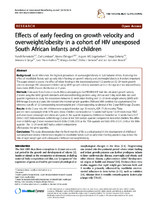Effects of early feeding on growth velocity and overweight/obesity in a cohort of HIV unexposed South African infants and children
Date
2015Author
Ramokolo, Vundli
Lombard, Carl
Chhagan, Meera
Engebretsen, Ingunn M.S.
Doherty, Tanya
Jackson, Debra
Metadata
Show full item recordAbstract
BACKGROUND: South Africa has the highest prevalence of overweight/obesity in Sub-Saharan Africa. Assessing the
effect of modifiable factors such as early infant feeding on growth velocity and overweight/obesity is therefore important.
This paper aimed to assess the effect of infant feeding in the transitional period (12 weeks) on 12–24 week growth
velocity amongst HIV unexposed children using WHO growth velocity standards and on the age and sex adjusted body
mass index (BMI) Z-score distribution at 2 years.
METHODS: Data were from 3 sites in South Africa participating in the PROMISE-EBF trial. We calculated growth velocity
Z-scores using the WHO growth standards and assessed feeding practices using 24-hour and 7-day recall data. We used
quantile regression to study the associations between 12 week infant feeding and 12–24 week weight velocity (WVZ) with
BMI-for-age Z-score at 2 years. We included the internal sample quantiles (70th and 90th centiles) that approximated the
reference cut-offs of +2 (corresponding to overweight) and +3 (corresponding to obesity) of the 2 year BMI-for-age Z-scores.
RESULTS: At the 2-year visit, 641 children were analysed (median age 22 months, IQR: 17–26 months). Thirty
percent were overweight while 8.7% were obese. Children not breastfed at 12 weeks had higher 12–24 week mean WVZ
and were more overweight and obese at 2 years. In the quantile regression, children not breastfed at 12 weeks had a 0.37
(95% CI 0.07, 0.66) increment in BMI-for-age Z-score at the 50th sample quantile compared to breast-fed children. This difference
in BMI-for-age Z-score increased to 0.46 (95% CI 0.18, 0.74) at the 70th quantile and 0.68 (95% CI 0.41, 0.94) at the 90th
quantile . The 12–24 week WVZ had a uniform independent
effect across the same quantiles.
CONCLUSIONS: This study demonstrates that the first 6 months of life is a critical period in the development of childhood
overweight and obesity. Interventions targeted at modifiable factors such as early infant feeding practices may reduce the
risks of rapid weight gain and subsequent childhood overweight/obesity.

